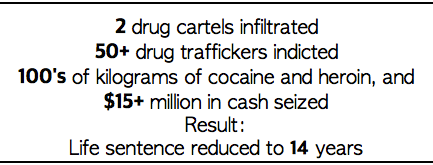5th Feb 2015

The sentencing of Pedro and Margarito Flores on January 27, 2015, in Chicago, is an example of cooperation with the Government that wins relatively great rewards. The Flores twins were leaders of Chicago’s most significant drug-trafficking ring and were in the “highest echelons of the Mexico-based Sinaloa Cartel,” according to the Government. They faced life in prison for their crimes. However, the twins began to cooperate with the Government in 2008. They even went as far as recording two conversations with “El Chapo” Guzman, the head of the Sinaloa Cartel. In exchange for this cooperation, the twins were sentenced to only fourteen years in prison. As AP reports, “a federal prosecutor … poured praise on Pedro and Margarito Flores, portraying them as among the most valuable traffickers-turned-informants in U.S. history … With credit for time served awaiting sentencing and for good behavior in prison, the brothers, now 33, could be out in as little as six years.” As a result of their cooperation, the Government obtained indictments of Guzman and at least fifty others.
What lessons should we take (and not take) from this?
Besides the potential rewards of cooperation, this news is also an example of the risks of cooperation. The Flores twins and their families will be in danger of the Cartel’s retaliation for the rest of their lives. Most defendants’ cooperation is not this spectacular, yet everyone who considers cooperation with the Government should weigh this risk.
A sentence reduction from life to 14 years is exceptional, but not unheard of. Sentence reductions can be as little as 15% off the original sentence (for example, a 60-month sentence is reduced to a 51-month sentence, or a ten-year sentence to a eight-and-a-half-year sentence), or as much as many years. It depends on factors such as the value of the cooperation to the Government and the general attitude of the federal prosecutor. Sentences can be reduced for anything from assistance with a run-of-the-mill drug case to reporting (even many years after the defendant has begun serving his time) a cellmate’s confession of an unsolved crime.
If you or your loved one is considering cooperation, do not proceed without the help of an experienced attorney. See our article on sentence reductions (click here for a condensed version for slower Web connections) for more explanation of the process.
We are providing free consultations on these matters. Call us today at (512) 693-9LAW or email us if you’d like to discuss it. Click on the “Contact Us” link here or at the top of the page, and we would be glad to talk to you.
by Chad Van Cleave

